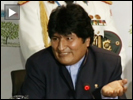
At the U.N. Climate Change Conference in Cancún, U.S. Special Envoy for Climate Change Todd Stern refuses to comment on the WikiLeaks cables’ account of discussions with the European Union on using climate aid to gain the backing of small island states for the informal Copenhagen Accord reached at last year’s U.N. climate summit. He also avoided answering a question addressing the removal of funding to Bolivia and Ecuador, whose governments opposed the accord. [includes rush transcript]
Transcript
AMY GOODMAN: I put a similar question to U.S. special climate change envoy Todd Stern and his deputy envoy, Jonathan Pershing. They held a news conference right after Hedegaard. Todd Stern answered.
AMY GOODMAN: A question about the WikiLeaks documents, the U.S. State Department cables, for example, the one in February of this year, the meeting between you, Jonathan Pershing, and the European commissioner on climate change, Hedegaard, talking about especially the Alliance of Small Island States, that they could be the “best allies” on the Copenhagen Accord, given their need for financing, and then Maldives getting millions of dollars. There’s a great deal of discussion here, inside and outside the summit, about the kind of coercion that goes on either to get nations to sign on to the accord or to punish those who won’t, like Bolivia and Ecuador. The question has been going back and forth: is it bribery or democracy? What can we expect from this? And what is your comments on the WikiLeaks release?
TODD STERN: Thanks very much. Well, on the WikiLeaks release, per se, I have no comment. And that’s a U.S. government position, and we don’t comment on leaks of classified or private information. So I’m not going to comment on WikiLeaks directly.
I will tell one little anecdote in connection with your broader question, let’s say, which is to be reminded of one of the most forceful, eloquent and powerful interventions that was made in that long middle-of-the-night final night in Copenhagen last year, where the forceful and eloquent minister from Norway, Erik Solheim, stood up after being accused directly — and I don’t remember what country did it — of Norway engaging in bribery by being so outstandingly generous in its provision of climate assistance. And he just stood up and blasted the person who suggested that, by saying, you know, you can’t, on the one hand, ask for and make a strong case, legitimately strong case, for the need for climate assistance and then, on the other hand, turn around and accuse us of bribery. I mean, if you want to accuse us of bribery, then, you know, you don’t need to — you don’t need to — we can eliminate any cause for accusation of bribery by eliminating any money. And Erik was powerful in that statement. I agreed with it 110 percent then, and I do now.
AMY GOODMAN: What about the countries that were punished then, Bolivia, Ecuador, for not signing?
TODD STERN: Let’s go to the next question.
MODERATOR: I think we’ll go to the next question, and we’ll turn to this side of the room.
AMY GOODMAN: That follow-up question that I asked the U.S. special climate change envoy — Todd Stern refused to answer — was about the U.S. withholding funds to countries like Ecuador and Bolivia, when they refused to sign on to the Copenhagen Accord.












Media Options